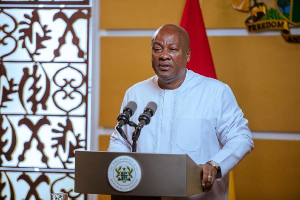 President John Dramani Mahama
President John Dramani Mahama
President John Mahama has announced plans to introduce a second gas processing train to facilitate Ghana’s transition from crude oil to natural gas for power generation.
“Ghana is seeking to phase out the use of crude oil in its power generation mix over the medium term,” President Mahama stated.
According to Mahama, this initiative will not only reduce the country’s reliance on crude oil, but also lower electricity costs and enhance energy security.
The planned development of a second gas processing train is intended to improve energy efficiency, expand the domestic gas supply, and promote a cleaner and more sustainable fuel source, according to a report by citinewsroom.com
President Mahama added; “There was a bit of disinvestment in the energy sector, but new commitments are coming up. So, for instance, we are going to build a second gas train, which is going to handle more gas from our first field.
“We are going to put more gas on stream, so we need a second train because our current plant in Atuabo cannot handle the extra gas.”
This project aims to optimise Ghana’s energy mix and promote sustainable development.
Crude oil has been a volatile and costly fuel source for Ghana’s thermal power plants.
However, the president believes that replacing it with natural gas will alleviate the pressure on the energy sector, which has faced challenges such as mounting debts and high operational costs for independent power producers (IPPs).
“ENI is back; they are drilling again, and early signs are that we might find a considerable quantity of oil and gas. When that happens, we can eliminate crude oil power generation completely in the next three to five years,” the president remarked during the 2025 Africa CEO Forum in Abidjan.
He also noted that the current economic recovery positions Ghana as an attractive destination for both midstream and upstream opportunities, emphasising that the current macroeconomic environment is favorable and stable for business.
President John Dramani Mahama invited investors to partner with the government in scaling up oil and gas infrastructure for long-term growth.
“The oil and gas sector was toxic. I don’t know for what reasons, but I think governments have not prioritised the sector. But I will lay a red carpet for anyone who wants to drill and pump in Ghana,” he concluded.
Mahama’s proposal underscores efforts to diversify Ghana’s energy sector and mitigate the impact of fluctuating crude oil prices on the economy.
NAD/AE
